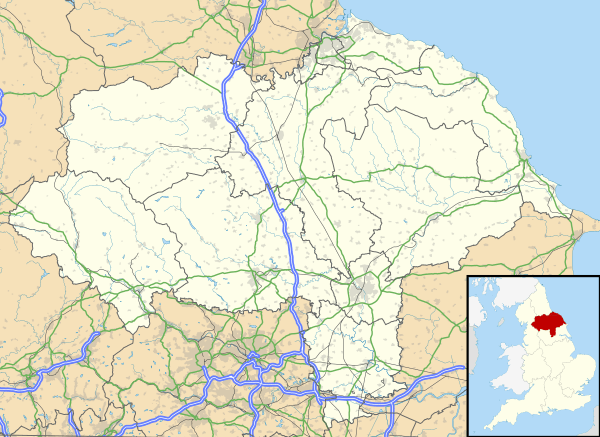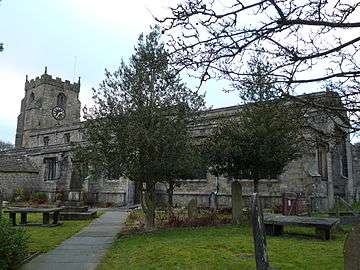Giggleswick
Giggleswick, a village and civil parish in the Craven district of North Yorkshire, England, lies on the B6480 road, less than 1 mile (1.6 km) north-west of the town of Settle and divided from it by the River Ribble. It is the site of Giggleswick School.
| Giggleswick | |
|---|---|
 Giggleswick in snow | |
 Giggleswick Location within North Yorkshire | |
| Population | 1,270 (2011 census)[1] |
| OS grid reference | SD809647 |
| • London | 205 mi (330 km) south-east |
| District | |
| Shire county | |
| Region | |
| Country | England |
| Sovereign state | United Kingdom |
| Post town | SETTLE |
| Postcode district | BD24 |
| Dialling code | 01729 |
| Police | North Yorkshire |
| Fire | North Yorkshire |
| Ambulance | Yorkshire |
| UK Parliament | |

Etymology
A Dictionary of British Place Names contains the entry:
Railway station
The village is served by Giggleswick railway station which provides services to Leeds in one direction and Lancaster and Morecambe in the other. There are five trains a day in each direction, is operated by Northern.
Close to the station and opposite the Craven Arms Hotel (formerly the Old Station Inn) is the Plague Stone.[4] This has a shallow trough, which in times of plague was filled with vinegar to sterilize the coins that were left by townspeople as payment for food brought from surrounding farms.[5] The stone was moved a short distance from its original site when the Settle bypass was built.
Church of St Alkelda
The parish church is dedicated to St Alkelda, an obscure Anglo-Saxon saint associated with the North Yorkshire town of Middleham. The building dates mostly from the 15th century, but carved stones discovered during the restoration of 1890–1892 indicated that a building existed on the site before the Norman Conquest.[6]:p.222 It has been designated by English Heritage as a Grade I listed building.[7] The restoration was carried out by the Lancaster architects Paley, Austin and Paley, and included replacing the roof, removing the gallery, rebuilding the vestry, and reseating, replastering and reflooring the church.[8]
Notable people
Richard Whiteley of Channel 4's Countdown was a pupil at Giggleswick School.[9] In his will he left the school £500,000, which was used to build a new theatre named after him.[10] Russell Harty was an English teacher at the same time that Whiteley attended as a pupil.[9] The operatic soprano, Sarah Fox, was born in the village and attended Giggleswick School.[11] The Star Wars actor Anthony Daniels also attended the school.[12] The film and stage actor Clarence Blakiston (1864–1943) was born here, as was Henry Maudsley, the pioneering British psychiatrist, at a farm outside Giggleswick in 1835. The Victorian-era actor Sir John Hare was born here in 1844.[13] Professor Sir Nevill Francis Mott, who won the Nobel prize in physics in 1977, was born in Leeds, and brought up in Giggleswick.
Tourist attractions
Giggleswick is notable amongst rock climbers for a limestone crag, retro-bolted with many sports routes during 2005 and 2006. The crag is opposite Settle Golf Club on the B6480, north of Giggleswick.
In the media
An episode of the radio comedy The Shuttleworths was set in Giggleswick.[14] Comedy writers Ray Galton and Alan Simpson used the town as their emblem of a travelling actor's date with obscurity in Hancock's Half Hour, The Train Journey episode, broadcast on 23 October 1959.[15][16] Les Dawson did the same, in 1975, in Dawson's Weekly.[17] In 1989, the TV series Capstick's Law, focused on a family law firm in the 1950s, was filmed using Russell Harty's old cottage as a venue.[18] The TV series 24seven was filmed at Giggleswick School.[19]
1927 eclipse
Among few observers of a 24-second solar eclipse in 1927 were members of the Astronomer Royal's expedition to Giggleswick.[20]
See also
References
- UK Census (2011). "Local Area Report – Giggleswick Parish (1170216748)". Nomis. Office for National Statistics. Retrieved 26 March 2018.
- Mills, A.D. (2011). A dictionary of British place-names (1 rev ed.). Oxford: Oxford University Press. p. 205. ISBN 9780199609086.
- Ekwall, Eilert (1960). The concise Oxford dictionary of English place-names (4 ed.). Oxford: Clarendon Press. p. 195. ISBN 0-19-869103-3.
- "Settle Church, Giggleswick Vicars and Their Times". www.settlechurch.org.uk. Retrieved 3 May 2017.
- Speight, Harry (1892). "III; Giggleswick, Stackhouse, Locks". Craven and the north west Yorkshire highlands. London: E Stock. p. 96. OCLC 650329471.
- Brayshaw, Thomas; Robinson, Ralph M (1932). The Ancient Parish of Giggleswick. London: Halton and Co. OCR copy by North Craven Historical Research Archived 9 May 2008 at the Wayback Machine Retrieved 14 November 2012
- Historic England. "Church of St Alkelda, Giggleswick (1157303)". National Heritage List for England. Retrieved 21 July 2012.
- Brandwood, Geoff; Austin, Tim; Hughes, John; Price, James (2012), The Architecture of Sharpe, Paley and Austin, Swindon: English Heritage, p. 238, ISBN 978-1-84802-049-8
- Barker, Dennis (27 June 2005). "Richard Whiteley". The Guardian. Retrieved 3 May 2017.
- "Star's £500,000 theatre boost". Bradford Telegraph and Argus. 27 June 2008. Retrieved 3 May 2017.
- Moore, Lindsey (27 May 2016). "Top soprano Sarah Fox helps give Craven a voice as part of new community initiative". Craven Herald. Retrieved 3 May 2017.
- "Giggleswick". www.yorkshiredales.co.uk. Retrieved 3 May 2017.
- Howse, Geoffrey (2010). "3. High Achievers". The little book of Yorkshire. Stroud: History Press. p. 57. ISBN 978-0-7524-6267-7.
- "Mini-Break in Giggleswick, Series 1, The Shuttleworths - BBC Radio 4 Extra". BBC. Retrieved 4 May 2017.
- "The Train Journey, Hancock's Half Hour". BBC. Retrieved 4 May 2017.
- Williams, Michael (2012). "4. The 10:34 from Morecambe – a Brief Encounter with the "secret" train over the Pennines". On the slow train again (Updated ed.). London: Arrow. p. 73. ISBN 978-0-09955-285-7.
- "Dawson's Weekly". www.dvdcompare.net. Retrieved 4 May 2017.
- "Craven through the years". Bradford Telegraph and Argus. 11 August 1998. Retrieved 3 May 2017.
- "From the archives". Craven Herald. 1 March 2012. Retrieved 4 May 2017.
- Mee, Arthur (10 September 1927). "Wonders of the Great Eclipse". The Winnipeg Tribune. p. 44 – via newspapers.com.
External links
![]()